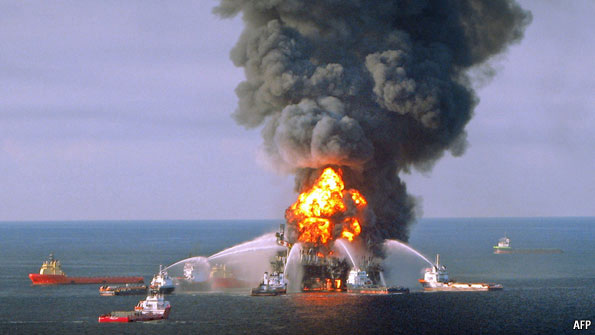I gotta say, this is heartbreaking. Leeville is a hardscrabble nothing town on the marshes, but for the people who live there, it’s everything. And it’s being taken away from them by the BP oil spill. Excerpts:
“This is tearing us up,” says Serigny, 57. “When everybody looks at each other, you can see it in people’s eyes. We’ve fought recessions, and storm after storm. We can’t fight this. . . . I don’t have no other place to live. I only went to the sixth grade. It would be hard for me to wear a tie and have a briefcase and look for a job.”
Terry Serigny was raised there on houseboats. He runs a bait shop. What’s he supposed to do now? Move to Roger Kimball’s house? More:
He looks at the rowdy young security personnel around the pool table, then at the three regulars sitting at the bar. They’re pissed off, drinking Bud Light, narrowing their eyes at the out-of-towners. They say Leeville’s dead, that people are starting to starve, that lawlessness is coming, that despondency has already arrived. Townspeople cut the grass over and over to pass time. The natural order is upset. Fishermen aren’t meant to be mopping up oil in white hazmat suits.
“That’s not these guys,” says Wayne Thomas, a welder from Baton Rouge who retired to Leeville with his camper. “These boys are a dying breed. I’m sad to see our culture — the culture of living off the land — is gonna die because of a screw-up that could’ve been fixed before it happened.”
The town should be teeming right now, says Geraldine Busey, who works at Tyd’s tackle shop up the street. Instead it’s a ghost town. Everyone who’s left is slowly going crazy.
…because of a screw-up that could’ve been fixed before it happened. If this had been caused by a hurricane, it would have been terribly sad, but it’s an act of God, what can you do? But this was likely caused by BP cutting safety corners, and acting against the advice of contractors on that rig, who reportedly told them what they were doing was dangerous. This was surely worsened by the indisputable fact that BP had no real plan for this sort of thing in place — and by the fact that the U.S. government did a piss-poor job of checking up on their response plan, and regulating them.
Nobody outside Leeville cares about Leeville. But when you hear some fat-mouthing pundit, talk radio host or politician complaining about how unfairly BP is being treated, I want you to think about Terry Serigny, and the other people of Leeville, who had very damn little to start with, and who now have an oil-soaked piece of nothing. Think about Juanita Bryan, a small business owner whose livelihood and land are probably now worthless:
“We’re too old to start over,” Juanita says, sitting under a portrait of a smiling Jesus holding a fishing net.
Kudos to WaPo reporter Dan Zak for his fine work on this story. Here’s an addendum from his own website, below the jump. You’ll really want to read this:
There were many details I wanted to include in the story but couldn’t. One will stick with me regardless. I talked to a husband and wife who didn’t want their names printed or pictures taken. The husband, a fishing guide contracting for BP, had just arrived home from a 12-hour day working cleanup. He said the oil has “pretty much ruined” his life, that he’s “worked hard to get that spot at the end of the road” — the American dream, I guess — and now will not be able to afford to keep it. His spot is at the south end of the town’s dead-end road. His stilted house hangs over the bayou in the shadow of the soaring curve of Highway 1. It’s quiet and calm. His wife, who answered the door, needed to be coaxed out of the house, at first refusing to talk because “it’s too depressing.” Eventually she joined me on the house’s unfinished, slanting deck. Her hair was dyed red and looked orange, and she was wearing a ratty pink T-shirt, pajama bottoms and a wrist brace. She looked put-upon, but was very sweet. She talked about her dog Boomer, and how she rescued him from drowning in the bayou. She talked about how the land they own is probably worthless now, how they’ve already tapped into their hurricane emergency funds. It was the familiar, ceaseless tale of woe, without any promise of a happy end.
She talked. I listened. We said goodbye. As I turned to leave, she said, “Don’t let them forget about us.”
Enough about you, lady; what about those poor executives at BP? These fine folks have their back.

